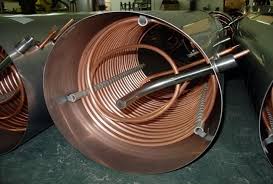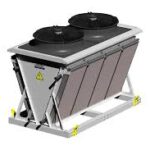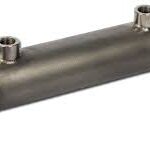Copper Heat Exchanger
Copper Heat Exchangers are devices designed to efficiently transfer heat between two fluids or between a fluid and a solid surface. They utilize copper, a highly conductive metal known for its excellent thermal properties. Copper heat exchangers are widely used in various applications due to their corrosion resistance, high thermal conductivity, and durability. They are commonly found in HVAC systems, refrigeration units, industrial processes, and plumbing systems where efficient heat transfer and reliability are critical.

Copper Heat Exchanger
Installation on
- Mount copper heat exchanger securely in an upright position.
- Use flexible hoses or vibration dampers to minimize pulsation and protect against vibration, thermal, and hydraulic stress.
- Ensure all connections are tight and secure to prevent leaks.
- Insulate exposed pipes to optimize energy efficiency.
- Conduct pressure testing to confirm system integrity.
- Document installation details for future reference and maintenance.
Copper Heat Exchanger
Types of
- Shell and Tube Heat Exchangers
- Plate Heat Exchangers
- Fin and Tube Heat Exchangers
- Coaxial Heat Exchangers
- Double Pipe Heat Exchangers
- Air-Cooled Heat Exchangers
- Brazed Plate Heat Exchangers
Copper Heat Exchanger
Key Advantages and Application of
- Excellent Thermal Conductivity: Ensures high efficiency in heat transfer applications.
- Corrosion Resistance: Enhances durability and lifespan, reducing maintenance needs.
- Antimicrobial Properties: Ideal for sanitary applications in food, beverage, and healthcare industries.
- Mechanical Strength: Can withstand high pressures and temperatures, making them reliable for various demanding applications.
- Versatility: Suitable for a wide range of applications, including HVAC, refrigeration, industrial processes, and automotive systems.
- Ease of Fabrication: Copper’s malleability allows for custom designs and easy installation.
- Energy Efficiency: Improves overall system performance and reduces energy consumption.
- Sustainability: Copper is recyclable, making it an environmentally friendly choice.
- High Reliability: Consistently performs under varied conditions, ensuring operational stability.
- Quick Response to Temperature Changes: Enables precise control in applications requiring rapid thermal adjustments.
Other Heat Exchangers We Manufacturer
Dry Cooler
Dry Cooler is a type of heat exchanger that uses ambient air to cool a fluid, typically water or a water-glycol mixture, without evaporating the fluid. It operates on the principle of sensible heat transfer

Stainless Steel Heat Exchanger
Stainless Steel Heat Exchangers are devices that use stainless steel as the primary material for transferring heat between fluids. They are valued for their corrosion resistance, durability in high temperatures and pressures

Marine Heat Exchanger
Marine Heat Exchangers are essential for cooling engines, generators, and onboard equipment using seawater or freshwater. Made from corrosion-resistant materials like titanium or cupronickel

Boiler Coils
Boiler coils are heat exchangers made of metal tubes arranged in a coil pattern, used in boiler systems to transfer heat from combustion gases to water or steam. They are typically made from heat-resistant materials

Tube in Tube Heat Exchanger
Tube in Tube Heat Exchangers consists of two concentric tubes where one fluid flows through the inner tube and another fluid flows through the annular space between the inner and outer tubes.

